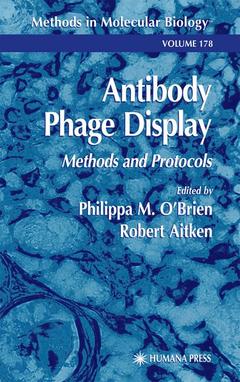Description
Antibody Phage Display, 2002
Methods and Protocols
Methods in Molecular Biology Series, Vol. 178
Coordinators: O’Brien Philippa M., Aitken Robert
Language: English
Subject for Antibody Phage Display:
Antibody Phage Display : Methods and Protocols (Methods in Molecular Biology, Vol. 178)
Publication date: 06-2002
402 p. · 16x23.5 cm · Hardback
Publication date: 06-2002
402 p. · 16x23.5 cm · Hardback
Antibody phage display methods and protocols
Publication date: 12-2001
401 p. · 15.5x23.5 cm · Paperback
Publication date: 12-2001
401 p. · 15.5x23.5 cm · Paperback
Description
/li>Contents
/li>Comment
/li>
The closing years of the 19th century and the start of the 20th century witnessed the emergence of microbiology and immunology as discrete sci- tific disciplines, and in the work of Roux and Yersin, perhaps the first benefits of their synergy?immunotherapy against bacterial infection. As we advance into the new millennium, microbiology and immunology again offer a c- ceptual leap forward as antibody phage display gains increasing acceptance as the definitive technology for monoclonal production and unleashes new - portunities in immunotherapy, drug discovery, and functional genomics. In assembling Antibody Phage Display: Methods and Protocols, we have aimed to produce a resource of real value for scientists who have followed the development of phage display technology over the past decade. The founding principles of phage display have always held an elegant simplicity. We hope that readers will find similar clarity in the technical guidance offered by the book?s contributors. In meeting our objectives, we have tried to cover the broad scope of the technology and the key areas of library construction, scre- ing, antibody modification, and expression. Of course, the technology cont- ues to advance apace, but we trust that readers will be able to gage the potential of phage display from our coverage, that some of its subtleties will emerge, and that our selection of methods will prove appealing. We are indebted to all the contributing authors for sharing their expertise with the wider scientific community.
Overview of Antibody Phage Display Technology and its Applications Hennie R. Hoogenboom Standard Protocols for the Construction of Fab Libraries Michelle A. Clark Standard Protocols for the Construction of scFv Libraries Simon Lennard Broadening the Impact of Antibody Phage Display Technology: Amplification of Immunoglobulin Sequences from Species Other than Humans or Mice Philippa M. O'Brien and Robert Aitken Construction of Large Naive Fab Libraries Hans J. W. de Haard Construction of Polyclonal Antibody Libraries Using Phage Display Jacqueline Sharon, Seshi R. Sompuram, Chiou-Ying Yang, Brent R. Williams and Stefanie Sarantopoulos Antigen-Driven Stimulation of B Lymphocytes In Vitro Zhiwei Hu The Recovery of Immunoglobulin Sequences from Single Human B Cells by Clonal Expansion Ruud M. T. de Wildt and René M. A. Hoet Panning of Antibody Phage Display Libraries: Standard Protocols David W. J. Coomber Selection of Antibodies Against Biotinylated Antigens Patrick Chames, Hennie R. Hoogenboom and Paula Henderikx Isolation of Anti-Hapten Specific Antibody Fragments from Combinatorial Libraries Keith A. Charlton and Andrew J. Porter Blocking Immunodominant Epitopes by Competitive Deselection Roberto Burioni Rescue of a Broader Range of Antibodies Using an Epitope-Masking Strategy Henrik J. Ditzel Screening of Phage-Expressed Antibody Libraries by Capture Lift Jeffry D. Watkins Antibody-Guided Selection Using Capture Sandwich ELISA Kunihiko Itoh and Toshio Suzuki Proximity-Guided (ProxiMol) Antibody Selection Jane Osbourn Isolation of Human mAbs Using Guided Selection With Mouse mAbs Mariangela Figini and Silvana Canevari Selecting Antibody to Cell Surface Antigens Using Magnetic SortingTechniques Don L. Siegel Isolation of Human Tumor-Associated Cell Surface Antigen binding scFv Fragments E. Jacintha Noronha, Xinhui Wang and Soldano Ferrone Subtractive Isolation of Single Chain Antibodies Using Tissue Fragments Katarina Radosevic and Willem van Ewijk Selection of Antibodies Based on Antibody Kinetic Binding Properties Ann-Christin Malmborg, Nina Nilsson and Mats Ohlin Selection of Functional Antibodies on the Basis of Valency Manuela Zaccolo Two-Step Strategy for Alteration of Immunoglobulin Specificity by in vitro Mutagenesis Yoshitaka Iba, Chie Miyazaki and Yoshikazu Kurosawa Targeting Random Mutations to Hotspots in Antibody Variable Domains for Affinity Improvement Partha S. Chowdhury Use of Error-Prone PCR for the Modification of Single-Chain Fv Fragments Pierre Martineau Use of E. coli Mutator Cells to Mature Antibodies Robert Irving, Gregory Coia, Anna Raicevic and Peter J. Hudson Chain Shuffling to Modify the Properties of Recombinant Immunoglobulins Johan Lantto, Pernilla Jirholt, Yvelise Barrios and Mats Ohlin Generation of Bispecific and Tandem Diabodies Sergey M. Kipriyanov High Level Periplasmic Expression and Purification of scFv Fragments Sergey M. Kipriyanov Periplasmic Expression and Purification of Recombinant Fab Fragments Robert L. Raffai Expression of Antibody Fragments in Pichia pastoris Philipp Holliger Expression of VHH Antibody Fragments in Saccharomyces Cerevisiae J. Marcel van der Vaart Intrabodies: Targeting scFv Expression to Eukaryotic Intracellular Compartments Pascale A. Cohen Expression of scFvs and scFv-Fusion Proteins in Eukaryotic Cells Michelle de Graaf, Ida van der Muelen-Muileman and Hidde J. Haisma Expression of Antibody Fabs Fragments and
Includes supplementary material: sn.pub/extras
© 2024 LAVOISIER S.A.S.




